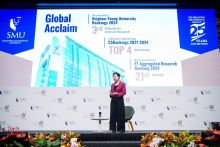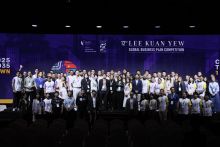
What began as code written by a three-man team led by SMU alumnus, Mohamed Afiq bin Mohamed Ismail contributed to the growth of a company with hundreds of partners — a true lesson in how innovation often starts small before being nurtured to grow.
It began with a bottleneck. In Asia’s sprawling logistics landscape, global delivery was either fast and expensive, or affordable and fractured. Sellers faced a choice: pay top dollar for established carriers or navigate a patchwork of smaller couriers across different countries with inconsistent standards.
Mohamed Afiq bin Mohamed Ismail, who prefers to go by “Mo” and his co-founders Nathaniel Yim, Junkai Ng, and Syed Ali Ridha Madihid recognised this gap and had an idea: a platform that could connect and coordinate these disparate players into a seamless network.
But vision is only the beginning of the journey.
“We started with a very small team,” Mo recalls. “I handled the backend and system architecture. We brought a frontend developer to speed things up.” Using Django, a developer-friendly framework with built-in tools, they moved fast. Within months, they had a working platform.
It wasn’t flawless — and that was the point. “Getting it out early let us collect feedback and improve the most important parts based on actual user needs,” Mo says. It was a lesson in iteration over perfection and demonstrated how even the most elegant systems need to meet the messy realities of global trade.
Building up a name in global logistics
If building the product was tough, earning stakeholder trust was even more challenging. “We had to figure out how to build our system while onboarding clients who each had different needs,” Mo explains. “At the same time, we had to convince delivery partners to work with us.
“We built trust through branding and content. A strong online presence, educational articles, and a solid website made us look like experts in the field. On top of that, we hired a capable sales and account team who met clients in person and handled the long process of moving them over to our platform.”
Trust, in the end, wasn’t built in one moment. It was earned, slowly, by consistently just showing up, solving problems, and making the technology disappear behind smooth service.
Some of their concepts didn’t survive the real world’s wants and needs.
“Initially, we aimed to fully automate and optimise the logistics journey with algorithms,” Mo says. But constraints — including the variety of customs rules, minimum delivery volumes and airline requirements — got in the way.
“These made it impossible to build a perfect end-to-end optimisation engine. So, we focused our efforts on the most important segments instead.”
This meant bringing parts of the operation in-house, managing their own warehouses and delivery points. The changes gave them more control and better margins — not what they planned, but exactly what the business needed.
In 2021, Janio’s work earned the team a spot on the Forbes 30 Under 30 list for Industry, Manufacturing & Energy in Asia.
The foundation that keeps giving
Mo’s journey began long before Janio — at SMU’s School of Computing and Information Systems.
His time at SMU was pretty formative, transforming him from a quiet, reserved individual into a confident and outspoken leader.
The key factors? SMU’s interactive pedagogy that encourages students to speak up in class. Mo also recalls experiences he didn’t fully appreciate at the time, but that he now treasures. He recounts being slightly annoyed at being forced to take non-tech modules related to accounting and entrepreneurship. In hindsight, though, that interdisciplinary mix proved invaluable during his startup journey at Janio.
As President of Caderas Latinas, SMU’s salsa performance team, Mo also led up to 80 members and ran events, including one overseas. “Managing a big, diverse group taught me how to communicate effectively and take responsibility,” he says.
Satisfied with the foundation he’s laid for the dev team to continue taking Janio to new heights, Mo left Janio in 2021, three years after co-founding the startup. Since then, he has been focused on guiding his team at PlayTours, a second startup – now armed with his experiences at SMU and Janio.
Managing a big, diverse group taught me how to communicate effectively and take responsibility
Mo Afiq, on being President of SMU Caderas Latinas salsa club
PlayTours is a software-based platform for building self-guided tour experiences. The idea: give creators and destinations an easy way to build interactive tours, from museum trails to urban adventures.
Compared to Janio, it’s lighter — no warehouses, no fleets, just software. And that’s exactly what Mo wanted. “I’ve always wanted to build something in the software space,” he says. “I wanted something that depended purely on the strength of the idea, coding, and execution, not physical operations like logistics. That’s what led to PlayTours.”
On leading with vision
What sets Mo apart isn’t grand vision, but relentless pragmatism.
“I wouldn’t call myself a serial entrepreneur,” he says. “I just enjoy building software that solves real problems.”
For those thinking of starting something of their own, his advice is grounded and clear: look to your own experiences for problems that you face — and think of ideas that can solve these problems. This philosophy was spun out of Mo’s experiences so far, with Janio, PlayTours and SMU.
He says with conviction: “Building something to solve my own problem ensured that I remained motivated to complete it, and that it is something I will continue using even after it has been built.”
The story of Janio wasn’t about disruption for its own sake — it was about clarity, execution, and staying close to the problem. And for Mo, that story is still “to be continued…”.
The SMU Edge
SMU’s School of Computing and Information Systems is focused on merging tech and business, which includes non-tech modules related to accounting and entrepreneurship. This helps in bridging the gap between the two fields, making it easier to collaborate across different departments and roles in business.


